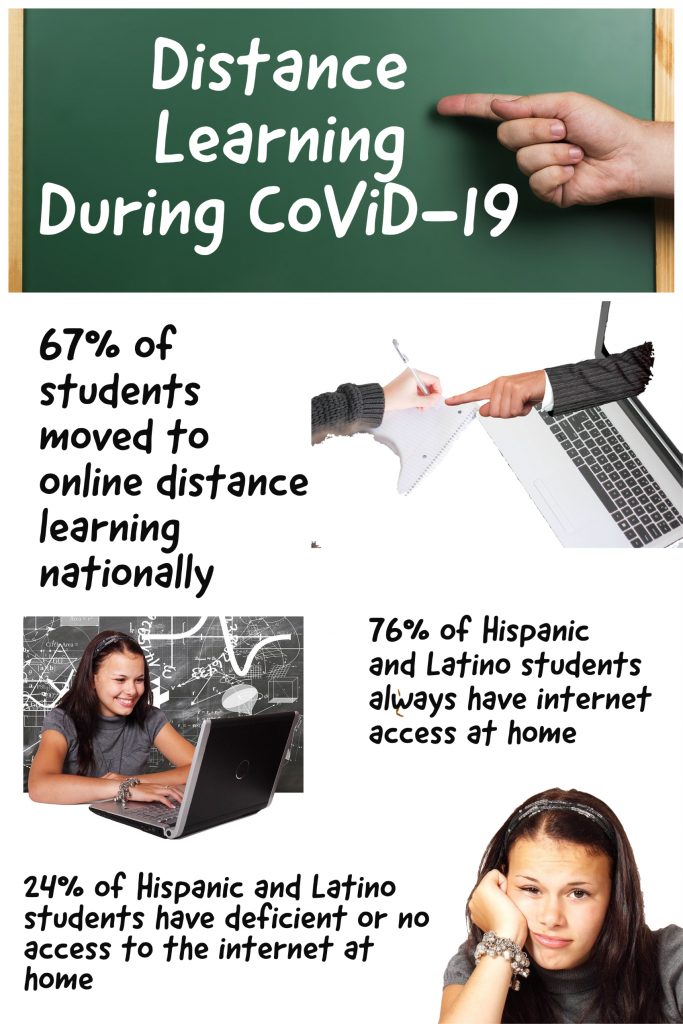CoViD-19 created hardship for millions of people throughout the United States. In less than 10% of CoViD cases, children and teens were not as impacted by contracting this infection as their parents. Young people, however, were impacted in other ways.
Pandemic countermeasures forced students to change physical classroom attendance for online classes. Since March 2020 however, some minority students have not received any education. Future Ready Schools concluded that “as many as 16.9 million children lacked home internet access.” Before the pandemic, a study conducted by Michigan State University found that “students who do not have access to the Internet from home or are dependent on a cell phone alone for access perform lower on a range of metrics, including digital skills, homework completion, and grade point average.”
Roberto Clemente Charter School in Allentown, Pennsylvania is also adjusting to the challenges of a pandemic education. With about a 90% Hispanic student population, this school faces many of the challenges minorities face nationwide.

According to National Center for Educational Statistics (NCES), about 67% of students nationally were moved to a distance learning format involving the use of online resources. This is a tremendous disadvantage for 23% of Hispanic and Latino students who according to the U.S. Census Bureau do not always have computer and internet access.
Mitza Morales, principal of the middle and high school at the charter school is in charge of implementing measures to effectively keep her students engaged in the learning process. “All our students have laptops and access points provided by the school,” said Morales. She was quick to point out that while access is only part of the challenges faced by her and other educational institutions, it is a significant one.
Distance education comes with a set of challenges for both teachers and students, Morales pointed out. She believes it is not only enough for all students to have the tools they need to communicate virtually if parents, teachers, and students do not come together and do their part in the education process. “For some minorities, it is important that they have a sense of trust [with their teachers]” says Morales. She states that her students perform better with teachers that take the time to ask about their personal issues and not just follow a “straight to business” teaching model.
Simple things such as learning to pronounce a student’s name correctly can go a long way. Morales explains that sometimes minority students feel teachers that don’t care enough to do little things like learning to pronounce their names correctly give an impression of not caring about their individual issues. Taking a vested interest in their lives goes a long way now just as it did before the pandemic.
Improving distance learning procedures is an interactive process for Roberto Clemente Charter School. Morales regularly meets with both students and teachers for invaluable feedback on how distance education is working. During one of these evaluations, a student explained that teachers were “trying to teach too many topics at once” during face-to-face meetings. Students found that overwhelming, so Morales spoke to her teachers about the issue and they adjusted to more focused lesson plans that turned out to be more effective.
In education, you get better results when you tailor methods to individuals as much as possible. “There are students that will need more interaction than others and these are the students that will be the first to come back into the classrooms,” said Morales. The school is also looking into measures for advanced students to enrich their learning by facilitating partnerships with institutions that will allow them to audit college classes.
For those students that have fallen behind, the school has plans to help them catch up to where they need to be. Morales mentioned school plans to implement summer classes specially geared to help these students.
According to Morales, the measures implemented at Roberto Clemente Charter School had the result of keeping most students at the academic level they should be. She will be the first to admit however, that it is inevitable for student learning overall not to be affected given the level of disruption the pandemic caused during these last two school years. “Currently, about 35% of students school-wide are in danger of failing at least two classes… Pre-CoViD it was about 15%,” Morales reports.
The full extent of the disadvantage to students this period of education will cause is yet to be seen. What is clear is that there have already been significant effects and that we must continue to adjust to them for the sake of our children’s educations.
